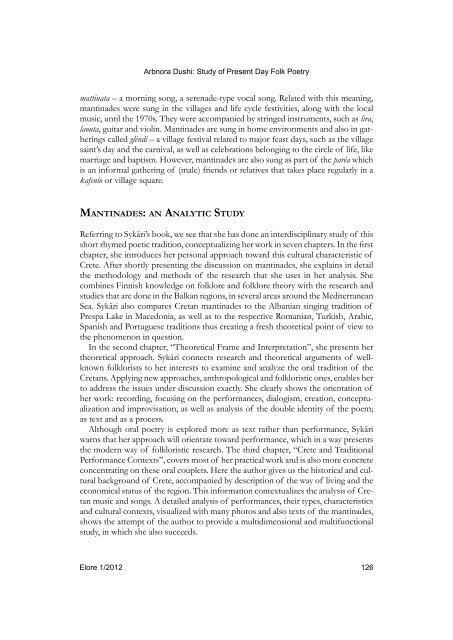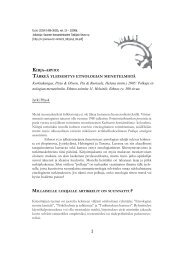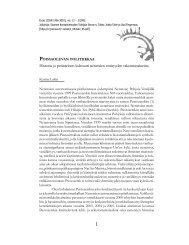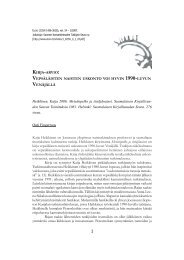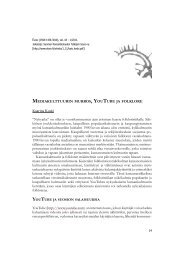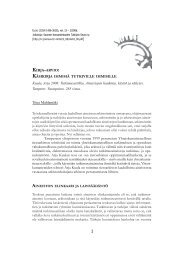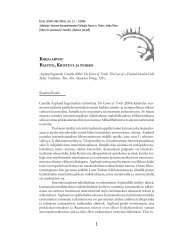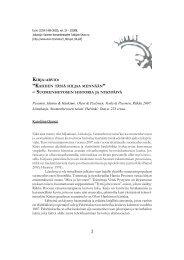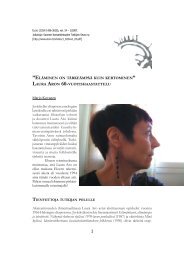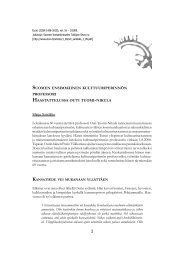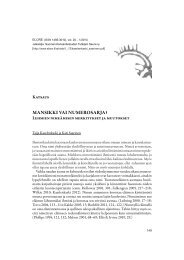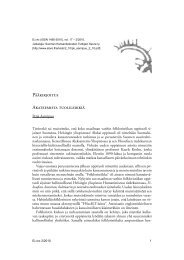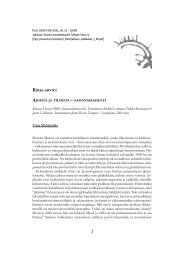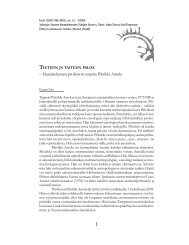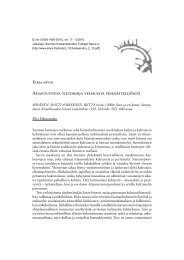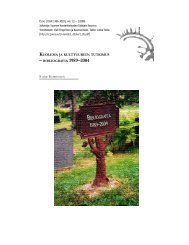Muutoksen tuulia - Elore
Muutoksen tuulia - Elore
Muutoksen tuulia - Elore
Create successful ePaper yourself
Turn your PDF publications into a flip-book with our unique Google optimized e-Paper software.
Arbnora Dushi: Study of Present Day Folk Poetry<br />
mattinata – a morning song, a serenade-type vocal song. Related with this meaning,<br />
mantinades were sung in the villages and life cycle festivities, along with the local<br />
music, until the 1970s. They were accompanied by stringed instruments, such as lira,<br />
laouta, guitar and violin. Mantinades are sung in home environments and also in gatherings<br />
called gléndi – a village festival related to major feast days, such as the village<br />
saint’s day and the carnival, as well as celebrations belonging to the circle of life, like<br />
marriage and baptism. However, mantinades are also sung as part of the paréa which<br />
is an informal gathering of (male) friends or relatives that takes place regularly in a<br />
kafenío or village square.<br />
Mantinades: an Analytic Study<br />
Referring to Sykäri’s book, we see that she has done an interdisciplinary study of this<br />
short rhymed poetic tradition, conceptualizing her work in seven chapters. In the first<br />
chapter, she introduces her personal approach toward this cultural characteristic of<br />
Crete. After shortly presenting the discussion on mantinades, she explains in detail<br />
the methodology and methods of the research that she uses in her analysis. She<br />
combines Finnish knowledge on folklore and folklore theory with the research and<br />
studies that are done in the Balkan regions, in several areas around the Mediterranean<br />
Sea. Sykäri also compares Cretan mantinades to the Albanian singing tradition of<br />
Prespa Lake in Macedonia, as well as to the respective Romanian, Turkish, Arabic,<br />
Spanish and Portuguese traditions thus creating a fresh theoretical point of view to<br />
the phenomenon in question.<br />
In the second chapter, “Theoretical Frame and Interpretation”, she presents her<br />
theoretical approach. Sykäri connects research and theoretical arguments of wellknown<br />
folklorists to her interests to examine and analyze the oral tradition of the<br />
Cretans. Applying new approaches, anthropological and folkloristic ones, enables her<br />
to address the issues under discussion exactly. She clearly shows the orientation of<br />
her work: recording, focusing on the performances, dialogism, creation, conceptualization<br />
and improvisation, as well as analysis of the double identity of the poem;<br />
as text and as a process.<br />
Although oral poetry is explored more as text rather than performance, Sykäri<br />
warns that her approach will orientate toward performance, which in a way presents<br />
the modern way of folkloristic research. The third chapter, “Crete and Traditional<br />
Performance Contexts”, covers most of her practical work and is also more concrete<br />
concentrating on these oral couplets. Here the author gives us the historical and cultural<br />
background of Crete, accompanied by description of the way of living and the<br />
economical status of the region. This information contextualizes the analysis of Cretan<br />
music and songs. A detailed analysis of performances, their types, characteristics<br />
and cultural contexts, visualized with many photos and also texts of the mantinades,<br />
shows the attempt of the author to provide a multidimensional and multifunctional<br />
study, in which she also succeeds.<br />
<strong>Elore</strong> 1/2012 126


